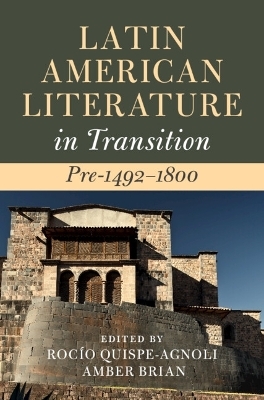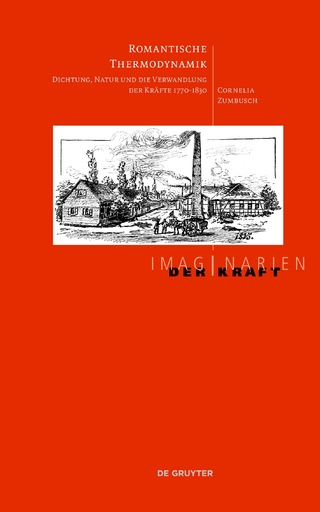
Latin American Literature in Transition Pre-1492–1800
Cambridge University Press (Verlag)
978-1-108-83883-2 (ISBN)
The year 1492 invokes many instances of transition in a variety of ways that intersected, overlapped, and shaped the emergence of Latin America. For the diverse Native inhabitants of the Americas as well as the people of Europe, Africa, and Asia who crossed the Atlantic and Pacific as part of the early-modern global movements, their lived experiences were defined by transitions. The Iberian territories from approximately 1492-1800 extended from what is now the US Southwest to Tierra del Fuego, and from the Iberian coasts to the Philippines and China. Built around six thematic areas that underline key processes that shaped the colonial period and its legacies – space, body, belief systems, literacies, languages, and identities – this innovative volume goes beyond the traditional European understanding of the lettered canon. It examines a range of texts including books published in Europe and the New World and manuscripts stored in repositories around the globe that represent poetry, prose, judicial proceedings, sermons, letters, grammars, and dictionaries.
Rocío Quispe-Agnoli is William J. Beal Distinguished Professor of Hispanic Studies at Michigan State University. Her publications include La fe andina en la escritura (2006); Nobles de papel (2016), which received the 2017 LASA-Peru Section Best Book Award; Women's Negotiations and Textual Agency in Latin America, 1500-1799 (2017, co-edited with Mónica Díaz). She is Editor-in-chief of REGS/Journal of Gender & Sexuality Studies. Amber Brian is Associate Professor at the University of Iowa. Her book Alva Ixtlilxochitl's Native Archive and the Circulation of Knowledge in Colonial Mexico (2016) was awarded honorable mention for MLA's Katherine Singer Kovacs Prize. Her collaborative translation and edition History of the Chichimeca Nation: Don Fernando de Alva Ixtlilxochitl's Seventeenth-Century Chronicle of Ancient Mexico (2019) was supported by the NEH.
Part I. Land, Space, Territory: 1. Migrations and foundations in the literature of New Spain Pablo García Loaeza; 2. Defining Portuguese America: The first depictions of Brazil within the context of overseas expansion Sarissa Carneiro; 3. The conquest of space in the Relación del Descubrimiento del Rio Marañon by Geronimo de Ypori (c. 1630) Yamile Silva; 4. Disturbing place: Afro-Iberian herbalists interrupt imperial Cartagena de Indias Kathryn Joy McKnight; Part II. Body: 5. The Health of the Soul: Religious guidance and medical practice in early colonial Mexico Yarí Pérez Marín; 6. Viceroy Valero's heart: A traveling relic, and an embodied metaphor in transit to the Indies Judith Farré Vidal; 7. Humoralism and colonial subjugation: Indians and medical knowledge in the sixteenth and seventeenth centuries Germán Morong Reyes; 8. Assaulted bodies: the case of two enslaved black women in the port city of Santa María de los Ángeles de Buenos Aires, 1772-1778 Mariselle Meléndez; Part III. Belief Systems: 9. The flood story in the Huarochirí Manuscript and other early colonial andean texts Soledad González Díaz; 10. Idol or Martyr: Sacredness and symbol in the religiosity of the Indies Esperanza López Parada; 11. Creole religiosity in colonial Mexico: Devotional cultures in transition Stephanie Kirk; 12. The empire beyond Spanish America: Spanish Augustinians in the Pacific World Eva María Mehl; 13. Indigenous peoples and Catholicism in eighteenth-century Mexico City Mónica Díaz; Part IV. Literacies: 14. Transcultural intertextuality in colonial Latin America Galen Brokaw; 15. Becoming a book: The reproduction, falsification, and digitalization of colonial codices José Ramón Jouve-Martín; 16. From print to public performance to Relaciones de fiestas: Don Quixote in viceregal festivals Eva María Valero Juan; 17. Colonial Latin American bibliography and the indigenous text Clayton McCarl and Lindsay Van Tine; Part V. Languages: 18. Technologies of communication in transition: Indigenous orality and writing in colonial Mexico Kelly S. McDonough; 19. A baroque arte: Horacio Carochi and the tradition of nahuatl grammars Caroline Egan; 20. Acquiring a voice: the plebeians speak in early colonial Río de La Plata Loreley El Jaber; 21. Knowledge in transition: Rethinking the science of sameness in Sor Juana Inés de la Cruz's New Spain Allison Margaret Bigelow; Part VI. Identities: 22. Textual figures and modalities of change: The Soldier, the Translator, the Plebeian, and the Woman Chronicler Valeria Añón; 23. Diego Muñoz Camargo and the destabilization of the Relación Geográfica: adaptation and variation in the Mestizo Chronicle Héctor Costilla Martínez; 24. Representing/erasing the other in colonial Brazil's eighteenth-century epic poetry Sandra Sousa.
| Erscheinungsdatum | 28.11.2022 |
|---|---|
| Reihe/Serie | Latin American Literature in Transition |
| Zusatzinfo | Worked examples or Exercises |
| Verlagsort | Cambridge |
| Sprache | englisch |
| Maße | 158 x 235 mm |
| Gewicht | 750 g |
| Themenwelt | Geisteswissenschaften ► Sprach- / Literaturwissenschaft ► Anglistik / Amerikanistik |
| Geisteswissenschaften ► Sprach- / Literaturwissenschaft ► Literaturwissenschaft | |
| ISBN-10 | 1-108-83883-9 / 1108838839 |
| ISBN-13 | 978-1-108-83883-2 / 9781108838832 |
| Zustand | Neuware |
| Haben Sie eine Frage zum Produkt? |
aus dem Bereich


